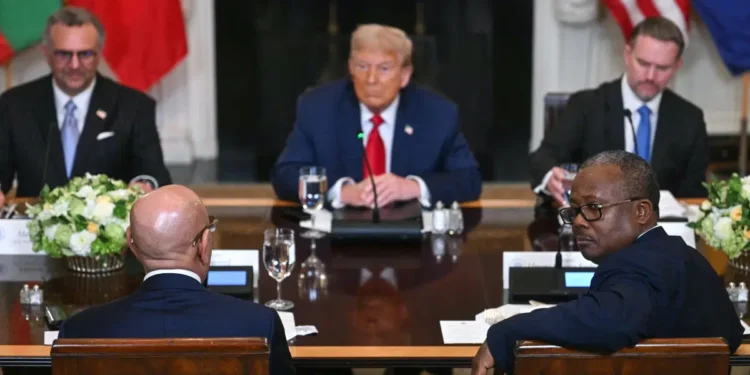A routine diplomatic gathering at the White House turned into an awkward cultural moment on Wednesday when President Donald Trump praised Liberian President Joseph Boakai for his “good English” and questioned where he learned to speak so well.
The incident unfolded during a luncheon designed to strengthen diplomatic ties between the United States and African nations. After President Boakai delivered brief remarks to the assembled dignitaries, Trump approached him with what many observers considered an culturally insensitive response.
“Thank you, and such good English… Where did you learn to speak so beautifully? Where were you educated?” Trump asked, seemingly unaware that his comments might be perceived as patronizing to the African leader.
President Boakai, a seasoned statesman and business graduate who has spent decades in public service, responded diplomatically that he was educated in Liberia. Witnesses noted that Boakai appeared uncomfortable with the exchange, turning away from cameras as he provided his muted response.
Trump persisted with his commentary on the Liberian president’s speech patterns, telling the gathering, “It’s beautiful English. I have people at this table who can’t speak nearly as well.” The remarks drew a mixture of nervous laughter and visible discomfort from other African leaders present, many of whom represent French-speaking nations across West Africa.
The exchange highlighted what diplomatic observers characterized as a lack of awareness about Liberia’s unique history and linguistic heritage. Unlike many African nations that adopted European languages through colonization, Liberia’s relationship with English stems from its founding by freed African-American slaves in the 19th century.
The West African nation was established through the efforts of the American Colonization Society, which facilitated the repatriation of formerly enslaved people to Africa. Liberia declared its independence in 1847, making it one of Africa’s oldest republics, with its founding fathers deliberately modeling the country’s political institutions after those of the United States.
English became Liberia’s official language from its inception, serving as the primary medium of government, education, and commerce. For most Liberians, including President Boakai, English functions as a first language rather than a colonial imposition, distinguishing the country from neighboring nations where European languages were introduced through different historical circumstances.
While Liberia maintains remarkable linguistic diversity with indigenous languages such as Kpelle, Mende, and Kissi spoken throughout the country, English serves as the common tongue that unites the nation’s various ethnic groups. President Boakai himself is multilingual, speaking several native languages in addition to his fluency in English.
The White House encounter reflects broader challenges in U.S.-Africa diplomatic relations, where cultural misunderstandings can undermine efforts to build stronger partnerships. African leaders and diplomatic experts have long advocated for more nuanced approaches to engagement that recognize the continent’s complex history and diverse linguistic landscapes.
Diplomatic sources suggested that while the remarks may have been intended as compliments, they revealed assumptions about African leaders that could complicate future diplomatic initiatives. The incident comes as the Trump administration seeks to strengthen economic and security partnerships across the African continent.
President Boakai, who has previously served as Vice President of Liberia and brings extensive experience in international relations, handled the situation with characteristic diplomacy. His measured response demonstrated the skilled statecraft that has defined his lengthy career in public service.
The luncheon continued without further incident, though the exchange quickly became a topic of discussion among diplomatic circles in Washington and across social media platforms, where commentators debated the implications of the president’s remarks for U.S.-Africa relations.
Neither the White House nor the Liberian delegation immediately responded to requests for comment about the exchange, though diplomatic observers noted that such moments often require careful management to prevent minor cultural missteps from affecting broader bilateral relationships.

















